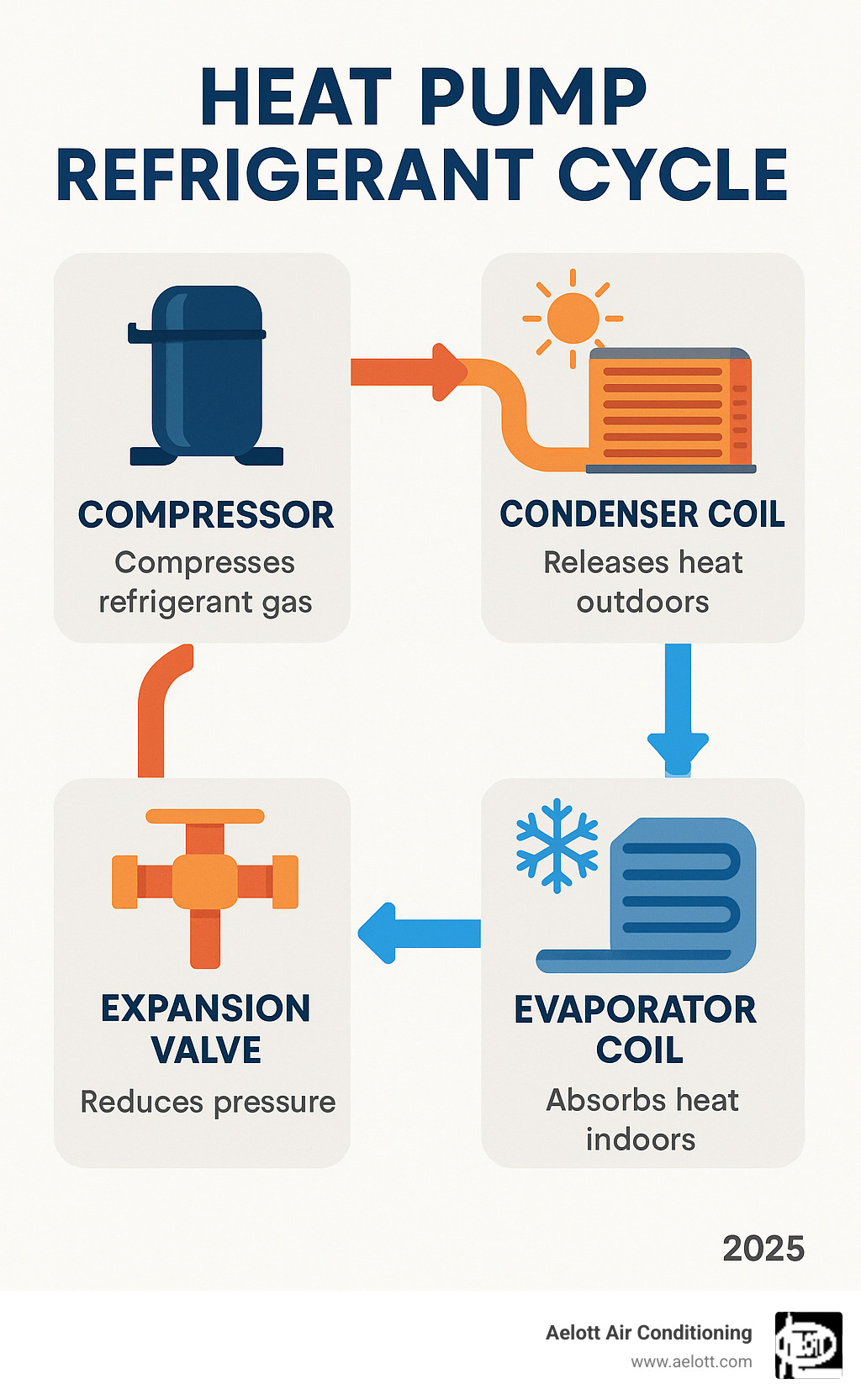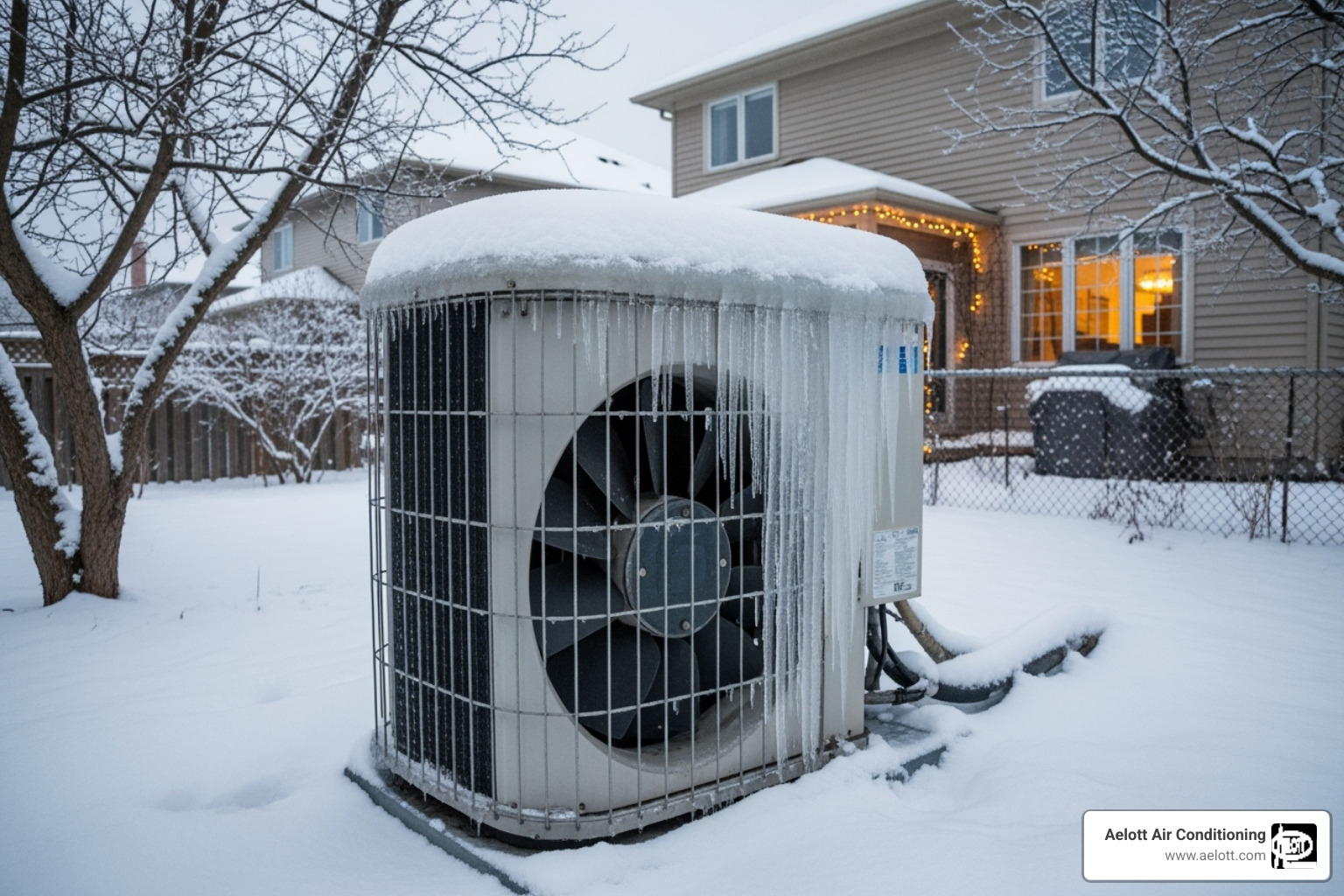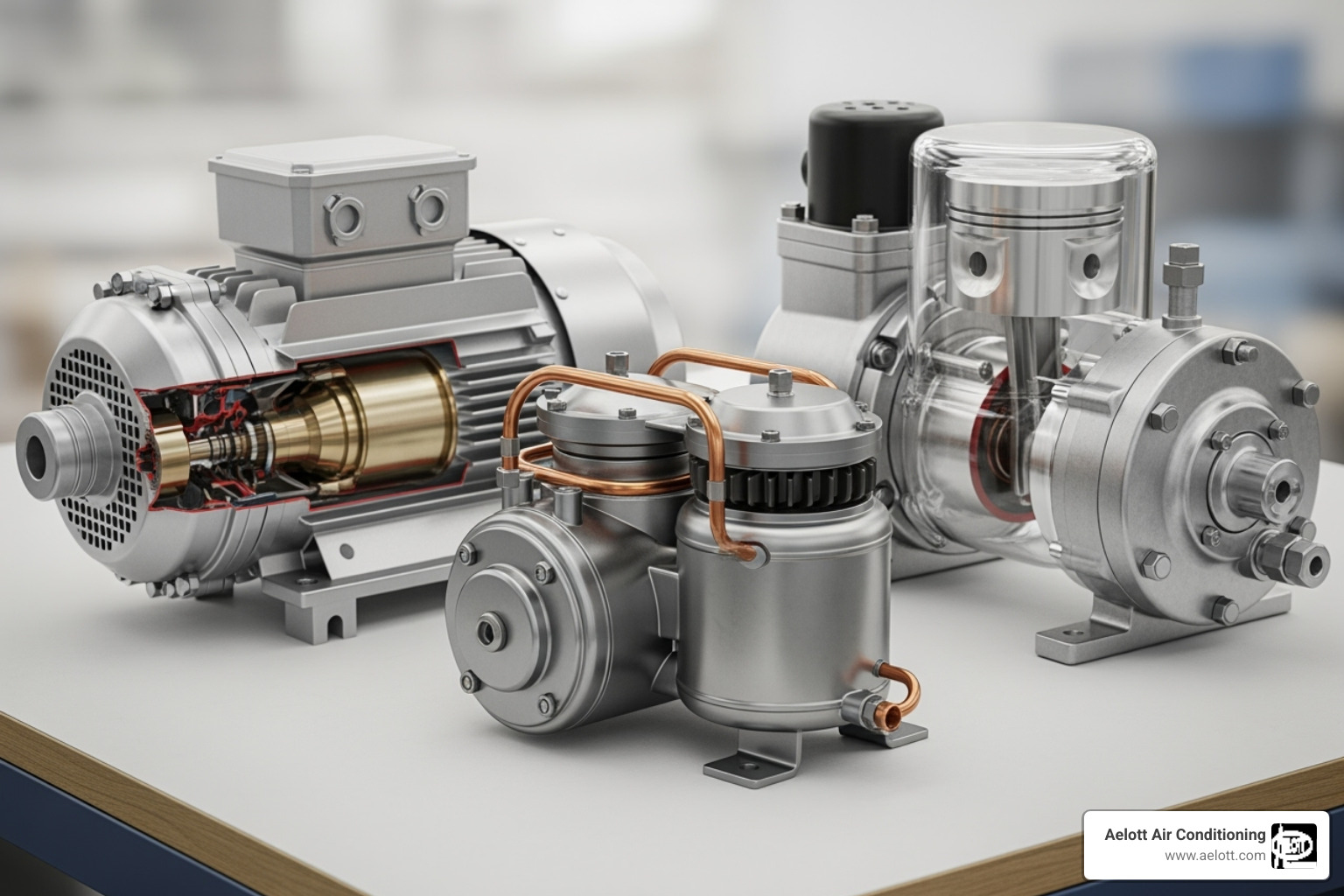.webp)
.webp)
The Ultimate Guide to Heat Pump Compressor Repair and Replacement
Heat pump compressor failing? Learn signs, causes, & costs of heat pump compressor repair. Get expert tips for repair vs. replacement.

Why Heat Pump Compressor Repair Is Critical for Your Home's Comfort
Prompt heat pump compressor repair can prevent a costly system replacement and keep your home comfortable. A failing compressor leads to discomfort, high energy bills, and potentially expensive repairs if not addressed quickly.
Quick Answer for Heat Pump Compressor Repair:
- Common Signs: Strange noises (grinding, clicking), ineffective heating/cooling, system won't start, short cycling
- Immediate Steps: Check thermostat settings, replace air filter, reset circuit breaker, clear outdoor unit debris
- Professional Help Needed: Electrical issues, refrigerant leaks, internal component failure
- Typical Lifespan: 10-15 years with proper maintenance
- Cost Factors: Age of system, extent of damage, refrigerant type, warranty coverage
Your heat pump's compressor is the heart of your HVAC system, circulating refrigerant to move heat between your home and the outdoors. Without it, your heat pump cannot function.
As the hardest-working and most expensive component, the compressor's health is vital. Understanding the warning signs and knowing when to call a professional can save you significant money and discomfort. Most issues arise from electrical problems, refrigerant leaks, or poor maintenance. While homeowners can perform basic troubleshooting, compressor repair involves high-voltage electricity and pressurized refrigerant, requiring certified professionals.

Identifying a Failing Heat Pump Compressor
If your heat pump is running but not delivering the comfort you expect, it may be time for a heat pump compressor repair. A failing compressor, much like a car with engine trouble, will show clear symptoms.

Key warning signs include:
- Ineffective Heating or Cooling: The system runs constantly but can't reach the thermostat's set temperature.
- Strange Noises: Alarming grinding, screeching, or excessive clicking sounds from the outdoor unit signal a problem. Normal operational hums are fine, but loud, unusual noises are a cry for help.
- Short Cycling: The system starts, runs for a few minutes, then shuts down repeatedly. This pattern indicates the compressor is struggling and puts immense strain on it.
- System Won't Start: Despite checking the thermostat and circuit breaker, the unit remains unresponsive.
- Climbing Energy Bills: A struggling compressor works harder, consuming more electricity and increasing your utility costs.
Common Signs and Noises of Compressor Distress
Specific sounds can help diagnose the issue. Grinding noises often mean internal components are wearing against each other, while screeching sounds can point to failing motor bearings. While some clicking is normal during startup and shutdown, excessive clicking may indicate a problem with electrical components like relays or capacitors.
Other symptoms like reduced airflow or lukewarm air from vents suggest the heat transfer process is failing. When the compressor can't properly pressurize refrigerant, it loses its ability to move heat. For more help identifying sounds, our guide on What Those Strange AC Noises Mean can be useful, as many principles apply to heat pumps.
A noisy compressor is usually trying to signal a specific problem:
- Loose Parts: Rattling or banging can be caused by loose bolts or brackets inside the unit.
- Failing Bearings: Worn-out bearings create grinding or screeching sounds that worsen over time.
- Electrical Problems: A failing capacitor might cause humming or clicking as it struggles to start the compressor.
- Refrigerant Issues: Too little or too much refrigerant forces the compressor to work outside its normal parameters, causing unusual noises.
- Debris in the Unit: Leaves and twigs can cause rattling or scraping sounds.
Unusual compressor noises require immediate attention. For more details, see our article on what to do when your AC Condenser is Making Unusual Grinding Noises.
Common Causes of Compressor Failure
Compressor failure is often a domino effect, caused by issues elsewhere in the system that put extra stress on this vital component. Many of these causes are preventable with regular maintenance and prompt attention to warning signs.
Common culprits for heat pump compressor repair needs include electrical issues, which disrupt the steady power flow a compressor needs, and refrigerant leaks, which force the compressor to overwork. Other contributing factors are dirty air filters and dirty coils, both of which restrict airflow and heat transfer, putting unnecessary strain on the system. Most failures are the result of ongoing stress from lack of maintenance, overheating, or worn components.
The Role of Electrical Components
Your compressor depends on several electrical parts to function. When they fail, the compressor struggles or stops working entirely.
- Failed Capacitors: These provide the initial electrical jolt to start the compressor motor. A bad capacitor may cause the compressor to hum without starting.
- Faulty Start Relays: Working with capacitors, these provide a power surge for startup. A failure can lead to short cycling or a non-starting unit.
- Damaged Wiring: Frayed or loose wires create intermittent connections, causing inconsistent performance.
- Tripped Circuit Breaker: While a simple reset might work once, frequent tripping indicates a deeper problem, such as the compressor drawing too much power. Our article on Why AC System is Tripping Circuit Breakers explains this further.
Refrigerant Leaks and Their Impact
Refrigerant is the lifeblood of your heat pump, carrying heat as it moves the refrigerant between the indoor and outdoor units. A refrigerant leak forces the compressor to work much harder to achieve the same cooling or heating, leading to overheating and premature wear. The compressor also relies on refrigerant for its own cooling, so low levels create a vicious cycle of compressor strain and overheating. Signs of a leak include hissing sounds, ice buildup on coils, and poor performance.
How a Faulty Thermostat Affects the Compressor
As the system's command center, a malfunctioning thermostat can send incorrect signals, causing the compressor to overwork or fail to start. This can be due to internal faults, dead batteries, or even poor thermostat location. A thermostat placed in direct sunlight or near a heat source will get inaccurate readings, leading to constant running or failure to start when needed. These seemingly minor issues can significantly shorten your compressor's lifespan.
Your Guide to Heat Pump Compressor Repair
When your heat pump compressor acts up, knowing what you can safely check yourself versus when to call a professional can save time and money.

Homeowner Troubleshooting Steps
Before calling for service, try these simple, safe, and often effective steps:
- Check Thermostat Settings: Ensure it's on the correct mode (heat/cool) with a sensible temperature setting. Check for dead batteries, a very common issue.
- Replace Air Filter: A clogged filter restricts airflow, forcing the system to overwork. We recommend you change your air filters every 1-3 months.
- Reset Circuit Breaker: Find the breaker for your HVAC system in your electrical panel. If it's tripped, flip it fully off, wait 30 seconds, and then flip it back on.
- Clear Debris from Outdoor Unit: Ensure the unit has at least two feet of clearance on all sides, free of leaves, grass, or overgrown shrubs.
If these steps don't resolve the issue, it's time to call a professional.
Understanding the Costs of Heat Pump Compressor Repair
Several factors influence the final cost of a heat pump compressor repair.
- The Compressor Part: Costs vary by type (single-stage, two-stage, variable-speed) and your heat pump's brand and model.
- Labor Costs: This is a complex job requiring certified technicians, specialized tools, and several hours to evacuate old refrigerant, install the new part, and recharge the system.
- New Refrigerant: The cost depends on the type. Older systems using R-22 (Freon) are more expensive to recharge than modern systems using R-410A.
- Warranty Coverage: A manufacturer's warranty may cover the part, but typically not the labor. Warranties can be voided by neglect or improper maintenance.
| Cost Consideration | Compressor Repair | Full System Replacement |
|---|---|---|
| Typical Investment | Significant repair cost | Higher upfront investment |
| What's Covered | Compressor and related parts | Complete new system |
| Warranty | Part may be covered, labor usually isn't | Full warranty on entire system |
| System Longevity | Extends current system life | Brand new lifespan |
| Efficiency Gains | Minimal improvement | Potentially major savings |
Repair vs. Replace: Making the Right Call
Deciding whether to repair or replace comes down to a few key factors:
- System Age: Heat pumps last 10-15 years. If your system is approaching or past this age, replacement is often wiser than repairing a major component.
- Repair History: If your unit requires frequent or major repairs, it may be more cost-effective to replace it.
- System Efficiency: Modern heat pumps are far more energy-efficient. A new system can lead to significant savings on utility bills, helping to offset the initial cost.
- Cost Comparison: If a repair costs more than a third of a new system's price, replacement usually offers better long-term value. A new Heat Pump provides improved reliability, efficiency, and full warranty protection.
Compressor Types and Proactive Maintenance
Understanding your heat pump's compressor type and performing regular maintenance are key to ensuring its longevity and preventing an unexpected breakdown.

Types of Heat Pump Compressors
Not all compressors are the same, and the type affects performance and potential heat pump compressor repair needs.
- Scroll Compressors: Common in modern heat pumps, these use two scrolls to compress refrigerant. They are known for quiet operation, efficiency, and durability due to having fewer moving parts. You can see how they work in this video about Scroll compressors.
- Reciprocating Compressors: These use pistons, similar to a car engine. Found in older systems, they are reliable and easier to repair but are generally noisier and less efficient than scroll types.
- Rotary Compressors: Typically used in smaller systems, these are compact but less efficient than scroll compressors.
- Variable-Speed Compressors: The most advanced type, these adjust their speed based on your home's heating or cooling needs. This provides consistent temperatures and superior energy efficiency.
Best Practices for Compressor Longevity
Preventive care is the best way to avoid expensive repairs and extend your compressor's life. Proper maintenance can help a compressor last well beyond its expected lifespan.
- Annual Professional Maintenance: A yearly tune-up is essential. A certified technician will inspect refrigerant levels, test electrical connections, and evaluate compressor performance, catching small issues before they become major problems. Our Heat Pump Repair Oceanside CA team offers comprehensive maintenance services.
- Regular Filter Changes: A dirty filter makes the entire system work harder. Check your filter monthly and replace it every 1-3 months.
- Keep Coils Clean: Dirt and debris on the outdoor unit's coils block heat transfer, forcing the compressor to overwork. A gentle rinse with a garden hose can help.
- Ensure Proper Refrigerant Levels: Only a certified technician can safely check and adjust refrigerant levels to prevent compressor strain.
- Protect the Outdoor Unit: Keep at least two feet of clearance around the unit and trim back any vegetation. For specific advice, our Heat Pump Repair Carlsbad CA team can help protect your unit from coastal climate challenges.
Frequently Asked Questions about Heat Pump Compressor Repair
Here are answers to the most common questions we receive about heat pump compressors during our service calls in Escondido and surrounding areas.
How long does a heat pump compressor last?
A well-maintained compressor typically lasts 10-15 years. However, its actual lifespan depends on factors like usage patterns, local climate, and, most importantly, regular professional maintenance. Consistent care can help a compressor exceed its expected lifespan, while neglect can cause it to fail much sooner.
Can I perform a heat pump compressor repair myself?
No, this is absolutely not a DIY project. Heat pump compressor repair involves high-voltage electricity and pressurized refrigerant, both of which pose significant safety risks without proper training, tools, and certification. Handling refrigerants requires EPA certification by law. Attempting a DIY repair can void your warranty, cause further damage, and lead to serious injury. Always call a certified professional for compressor work.
Is a noisy heat pump compressor dangerous?
The noise itself is not a direct danger, but it signals a serious problem that should not be ignored. It's a warning sign. The underlying cause, such as a failing electrical component, could pose a fire or safety hazard. Mechanically, sounds like grinding or screeching indicate severe internal wear that will eventually lead to a complete system breakdown. Addressing unusual noises promptly can prevent a total failure and potential safety issues.
Trust the Experts for Your Compressor Needs
A failing heat pump compressor is one of the most complex issues your HVAC system can face and requires professional attention. Recognizing the warning signs—from strange noises to a complete shutdown—is the first step. While homeowner troubleshooting like checking the thermostat and changing the filter is a good start, most heat pump compressor repair issues are beyond a DIY fix.
Compressor work involves high-voltage electricity and pressurized refrigerants, demanding the skills of a certified professional with the right tools and training. In Escondido and the surrounding areas, Aelott Air Conditioning has been the trusted choice since 1963.
Our experienced team provides honest diagnostics and reliable repairs to restore your family's comfort and peace of mind. We stand behind our work with a 100% satisfaction guarantee. When you call us, you get the confidence that comes from working with true professionals who get the job right the first time.
Contact us for professional heat pump repair in Escondido, CA

Customer Testimonials
Go With Experience

HVAC Financing Available!
Get 0% Financing for 12 Months with Deferred Interest! Enjoy no payments and no interest on select plans.


Latest Blogs

.avif)
How to Run Your Furnace Efficiently: A Guide to Staying Warm This Winter







